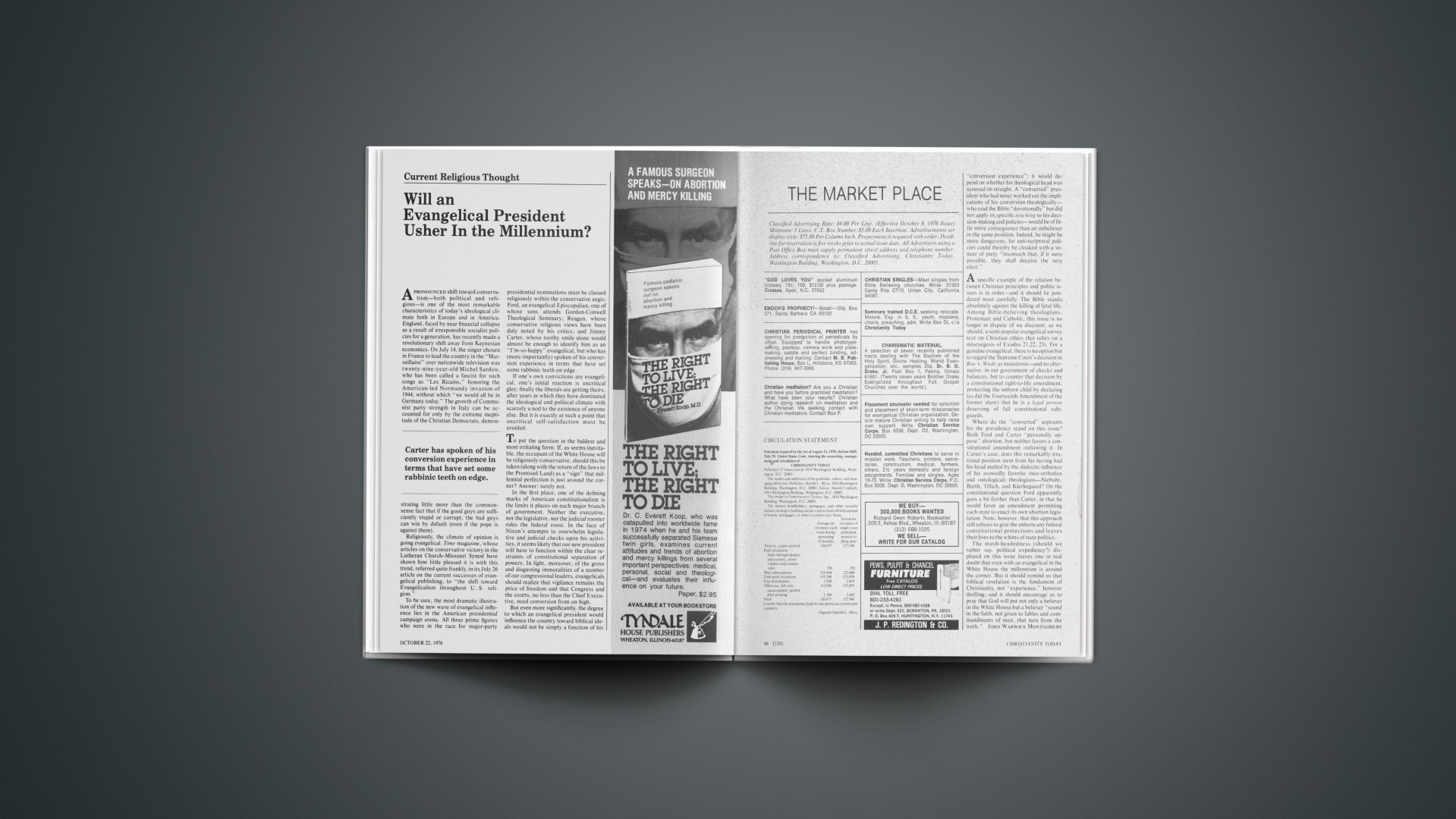A pronounced shift toward conservatism—both political and religious—is one of the most remarkable characteristics of today’s ideological climate both in Europe and in America. England, faced by near financial collapse as a result of irresponsible socialist policies for a generation, has recently made a revolutionary shift away from Keynesian economics. On July 14, the singer chosen in France to lead the country in the “Marseillaise” over nationwide television was twenty-nine-year-old Michel Sardou, who has been called a fascist for such songs as “Les Ricains,” honoring the American-led Normandy invasion of 1944, without which “we would all be in Germany today.” The growth of Communist party strength in Italy can be accounted for only by the extreme ineptitude of the Christian Democrats, demonstrating little more than the common-sense fact that if the good guys are sufficiently stupid or corrupt, the bad guys can win by default (even if the pope is against them).
Religiously, the climate of opinion is going evangelical. Time magazine, whose articles on the conservative victory in the Lutheran Church-Missouri Synod have shown how little pleased it is with this trend, referred quite frankly, in its July 26 article on the current successes of evangelical publishing, to “the shift toward Evangelicalism throughout U. S. religion.”
To be sure, the most dramatic illustration of the new wave of evangelical influence lies in the American presidential campaign arena. All three prime figures who were in the race for major-party presidential nominations must be classed religiously within the conservative aegis: Ford, an evangelical Episcopalian, one of whose sons attends Gordon-Conwell Theological Seminary; Reagan, whose conservative religious views have been duly noted by his critics; and Jimmy Carter, whose toothy smile alone would almost be enough to identify him as an “I’m-so-happy” evangelical, but who has (more importantly) spoken of his conversion experience in terms that have set some rabbinic teeth on edge.
If one’s own convictions are evangelical, one’s initial reaction is uncritical glee: finally the liberals are getting theirs, after years in which they have dominated the ideological and political climate with scarcely a nod to the existence of anyone else. But it is exactly at such a point that uncritical self-satisfaction must be avoided.
To put the question in the baldest and most irritating form: If, as seems inevitable, the occupant of the White House will be religiously conservative, should this be taken (along with the return of the Jews to the Promised Land) as a “sign” that millennial perfection is just around the corner? Answer: surely not.
In the first place, one of the defining marks of American constitutionalism is the limits it places on each major branch of government. Neither the executive, nor the legislative, nor the judicial rooster rules the federal roost. In the face of Nixon’s attempts to overwhelm legislative and judicial checks upon his activities, it seems likely that our new president will have to function within the clear restraints of constitutional separation of powers. In light, moreover, of the gross and disgusting immoralities of a number of our congressional leaders, evangelicals should realize that vigilance remains the price of freedom and that Congress and the courts, no less than the Chief Executive, need conversion from on high.
But even more significantly, the degree to which an evangelical president would influence the country toward biblical ideals would not be simply a function of his “conversion experience”: it would depend on whether his theological head was screwed on straight. A “converted” president who had never worked out the implications of his conversion theologically—who read the Bible “devotionally” but did not apply its specific teaching to his decision-making and policies—would be of little more consequence than an unbeliever in the same position. Indeed, he might be more dangerous, for anti-scriptural policies could thereby be cloaked with a veneer of piety “insomuch that, if it were possible, they shall deceive the very elect.”
A specific example of the relation between Christian principles and public issues is in order—and it should be pondered most carefully. The Bible stands absolutely against the killing of fetal life. Among Bible-believing theologians, Protestant and Catholic, this issue is no longer in dispute (if we discount, as we should, a semi-popular evangelical survey text on Christian ethics that relies on a misexegesis of Exodus 21:22, 23). For a genuine evangelical, there is no option but to regard the Supreme Court’s decision in Roe v. Wade as monstrous—and no alternative, in our government of checks and balances, but to counter that decision by a constitutional right-to-life amendment, protecting the unborn child by declaring (as did the Fourteenth Amendment of the former slave) that he is a legal person deserving of full constitutional safeguards.
Where do the “converted” aspirants for the presidency stand on this issue? Both Ford and Carter “personally oppose” abortion, but neither favors a constitutional amendment outlawing it. In Carter’s case, does this remarkably irrational position stem from his having had his head melted by the dialectic influence of his avowedly favorite (neo-orthodox and ontological) theologians—Niebuhr, Barth, Tillich, and Kierkegaard? On the constitutional question Ford apparently goes a bit farther than Carter, in that he would favor an amendment permitting each state to enact its own abortion legislation. Note, however, that this approach still refuses to give the unborn any federal constitutional protections and leaves their lives to the whims of state politics.
The mush-headedness (should we rather say, political expediency?) displayed on this issue leaves one in real doubt that even with an evangelical in the White House the millennium is around the corner. But it should remind us that biblical revelation is the fundament of Christianity, not “experience,” however thrilling; and it should encourage us to pray that God will put not only a believer in the White House but a believer “sound in the faith, not given to fables and commandments of men, that turn from the truth.”










